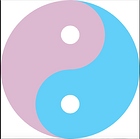When I Knew I Was a Girl

So often when the heterosexual cisgender population is confronted with a trans kid, their first comment is that the child “is too young,” or that the parent is “pushing their agenda” on the child, or that the child, “just wants to please their parent.”
In fact, research by Kristina R. Olson, Phd. has shown that “knowing whether a child consistently claims the ‘other’ gender identity might be the best single predictor of later transgender identity.”
Still, this concept is hard for a lot of people to swallow. In an effort to simplify the discussion, here’s my story of when I knew I was female.
My mother is a lesbian and my father is heterosexual. I have the rare vantage of being raised both within mainstream US society and also within the queer community. I was a parent-pleaser, and if anyone was susceptible to parental influence, it would have been me. But I knew who I was and who I wasn’t with total certainty from a very young age.
My mother didn’t want to raise me with sex-stereotyped toys. She rejected tiny kitchen playsets and baby dolls. One day she found me sitting on the floor, singing lullabies to a five-pound bag of kitty litter wrapped in a blanket. At that point she gave up and bought me a baby doll. I knew at two years old what toys I liked, and no amount of convincing would have made me prefer a Tonka truck over a baby doll. That’s not to say that I didn’t enjoy my Big Wheel or to occasionally play with my brother’s Criss Cross Crashrace set, but I definitely preferred dolls.
When I was in first grade I had the same haircut as my brother, my mother, and her partner. Short, parted on the side, not touching my collar in the back. Our gym teacher made us line up boy-girl-boy-girl, and he put me in the boy line, even though I was wearing a flower on my shirt. I can still feel the hot mortification and the struggle not to cry. I was six years old, and I knew I was a girl.
My mother’s partner is gender queer, also called a “butch lesbian” or a “male-identified lesbian” at various times in history. She prefers men’s clothing, and pretty much hates the princess culture. I loved her and wanted to please her. She encouraged me to be a tomboy. I loved to climb trees and play in the mud, but I wanted to do it with a Barbie doll clenched in my hand and while wearing a pink sparkly tutu, if possible.
My brother and I visited our father on summer vacations. Our father always had a wife or girlfriend, or sometimes both at the same time. There was a lot of talk in my father’s house about how “boys needed their fathers” and other such nonsense. I tried to win my father's affection by helping in the garage, or sailing, or eating dog biscuits. Anything to prove I wasn’t a sissy. But it never occurred to me to wear my brother’s clothing and declare myself a son. I would rather have eaten liver, and I despised liver.
It is only when someone doesn’t fit the norm that we assume they don’t have a clear idea of who they are. We assign blame to the parents. We assume the child doesn’t understand how gender works. But if we put ourselves back in the space of childhood, there were certain truths we knew unquestionably. We knew we loved our parents, or our pets, or our grandparents. We knew what home felt like, what kind of cookies were best, and what toys were the most fun. We knew if we were a boy or a girl.
Children in preschool or above in a traditional United States school know what the norms are, and are likely to receive negative peer feedback about breaking gender norms. They already know what the cost of not fitting in is. I’m not saying every child is 100% certain from birth as to who they are. But the ones that take the risk to tell us they are different should be believed. After all, when did you know you were a boy or girl?